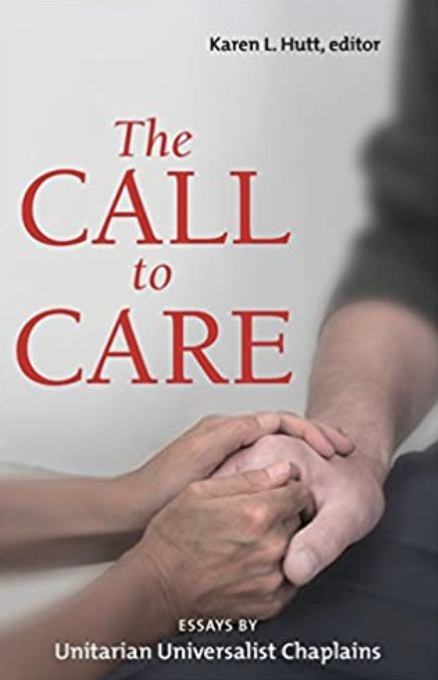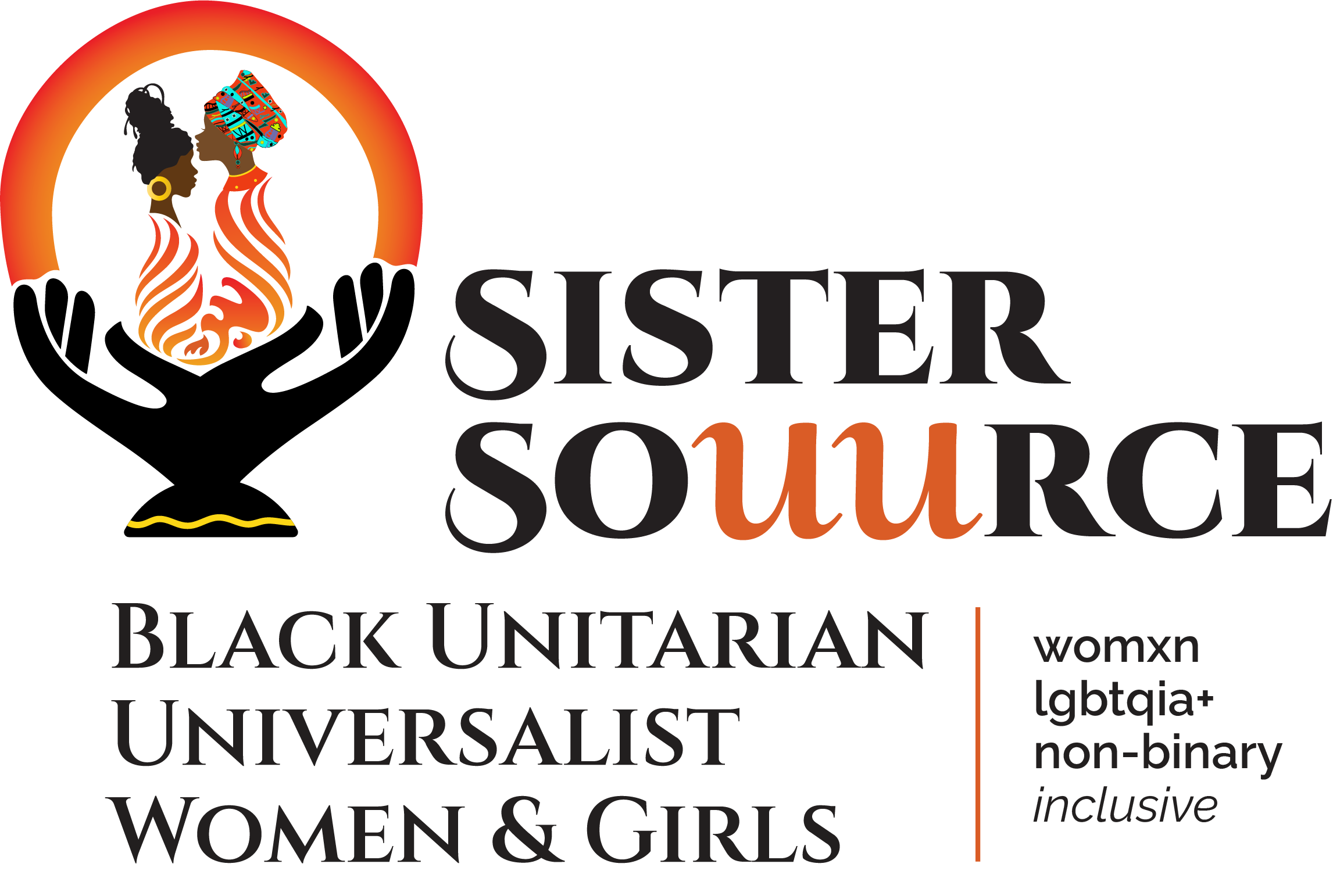
Book cover is copyrighted material used for illustrative purposes.
Book Review – The Call to Care: Essays by Unitarian Universalist Chaplains, edited by Karen L. Hutt
The Call to Care: Essays by Unitarian Universalist Chaplains is an anthology of essays written by UU chaplains serving individuals in diverse settings. The essays offer glimpses into the diverse and creative ways that UU chaplains serve their varied communities, as well as their reflections on their work.
In preparation for this important and specialized work, chaplains are required to have a Master of Divinity degree, thus they are all ministers. Chaplains must be endorsed by their faith community, in addition to completing at least four units of Clinical Pastoral Education (CPE). In 1925 Richard C. Cabot, a prominent physician and active Unitarian layperson in Boston published an article titled, “A Plea for a Clinical Year.”[1]
The first CPE Program was established at Worcester State Hospital, where Anton T. Boisen was chaplain. Boisen had had a long history of mental illness and psychotic episodes. As a result, he “explored the concept that mental illness presented a crisis brought about by the failure to grow into higher social loyalties, including loyalty to God. He believed mental illness could be cured by the power of religion.”[2] This new and radical method of theological learning emphasized communication, spiritual assessments, and collaboration with multidisciplinary care and treatment teams whose goal was the welfare and healing of the care seeker.
Keith W. Goheen, one of the contributors to the anthology, reflects on the sacred role of chaplains: “Amid the pain and brokenness in the world and in our souls, our relationships have the power to heal.”[3] Upon further reflection, Goheen recognizes the theological learning that links the professional and personal relationships as follows: “to recognize the spiritual character of the relationships within the families in my care, I must be well tuned to the spiritual character of my own professional and personal relationships.” [4]
Verbatims, or summaries of pastoral care encounters in which chaplains reflect on occurrences in their encounters with patients, allow chaplains in training, as part of their learning experience, to draw insights from these reflections for use in future pastoral care. Chaplains learn to develop relationships with strangers in crisis, and to gain comfort with ambiguity. Rebekah Ingram, another contributor to the anthology, links self-awareness, self-assessment and self-care, thusly: “Our assessments and the care we provide are inextricably tied to our own self-assessment and self-care practices.”[5]
While chaplains are expected to provide spiritual care and comfort to individuals representing vastly different faith traditions, UU chaplains can often bridge the challenging gap with those who identify as “No Religious Preference/NRP.” Another contributor, Rev. Cynthia Kane, reminds us that NRP does not mean “devoid of spiritual leanings or commitments.” [6] According to a 2010 Report by the Military Leadership Diversity Commission, less than 4 percent of all military personnel self-report as atheist or agnostic, coded as “humanist.”[7] While all chaplains are expected to serve across diverse faith traditions, UU chaplains may possess the flexible worldviews for the population that identifies as NRP, including those that identify as atheist, agnostic or humanist.
Xolani Kacela, a military chaplain who grew up in a military family, identified three important qualities for military chaplains: assertiveness, physical fitness, and flexibility. Kacela asserts that UUs’ lack of interaction with military personnel has resulted in a bias, that is, they view military personnel as “other.” He further asserts that this bias prevents military personnel from attending and possibly joining UU congregations. Additionally, Kacela posits that military organizations have changed individuals’ thinking and behaviors.
An examination of racist practices and sexual assault policies in the military highlights two instances in which the military’s modification of the institutional culture has resulted in individual and institutional change. Kacela reflects on the many practical aspects of chaplaincy, and the flexibility required to meet the needs of military populations.
The chaplains featured in the anthology are not hesitant to disagree. Kacela asserts that an effective chaplain must embrace and utilize the spiritual practices of those he or she serves. Chaplain Nathan Mesnikoff on the other hand, asserts the following: “… and despite my years of doing this work, I struggle with it from time to time because, at a deep level, I don’t believe what many of my patients do.”[8] The difference between the two conceptual frameworks is that Kacela attempts to meet the military personnel he serves where they are; in his ministering, a Christian would receive a Christian prayer, or scripture reading, while ministering to a Buddhist would include chanting, meditation, and teachings from Buddha. Mesnikoff, it appears, might struggle because of his inability to relate to the beliefs of others.
The many perspectives and experiences shared by the UU chaplains in The Call to Care convey the importance of a calming and centering presence during a spiritual crisis. It should be a reassuring source of pride that so many of our UU ministers serve as chaplains. The Call to Care highlights their contributions, and their profession.
– Reviewed by Rev. Dr. Qiyamah A. Rahman
[1] Karen L. Hutt. The Call to Care: Essays by Unitarian Universalist Chaplains. Boston: Skinner House Books, 2017. 198.
[2] https://www.ucc.org/anton-t-boisen-and-clinical-pastoral-education-cpe-2/
[3] Karen L. Hutt. The Call to Care: Essays by Unitarian Universalist Chaplains. Boston: Skinner House Books, 2017. 92.
[4] Karen L. Hutt. The Call to Care: Essays by Unitarian Universalist Chaplains. Boston: Skinner House Books, 2017. 79.
[5] Karen L. Hutt. The Call to Care: Essays by Unitarian Universalist Chaplains. Boston: Skinner House Books, 2017. 119.
[6] Karen L. Hutt. The Call to Care: Essays by Unitarian Universalist Chaplains. Boston: Skinner House Books, 2017. 129.
[7] Karen L. Hutt. The Call to Care: Essays by Unitarian Universalist Chaplains. Boston: Skinner House Books, 2017. 129.
[8] Karen L. Hutt. The Call to Care: Essays by Unitarian Universalist Chaplains. Boston: Skinner House Books, 2017. 41.
